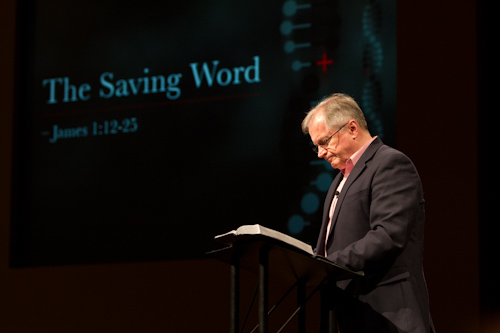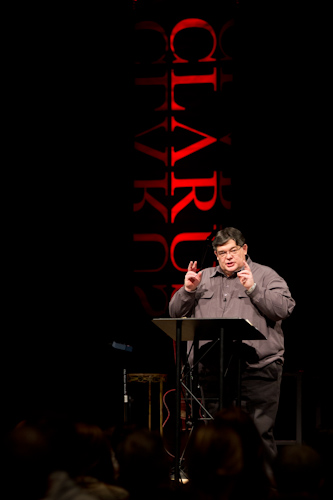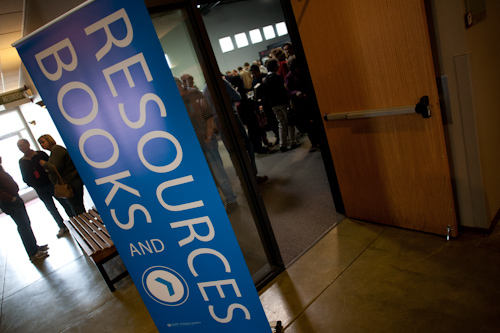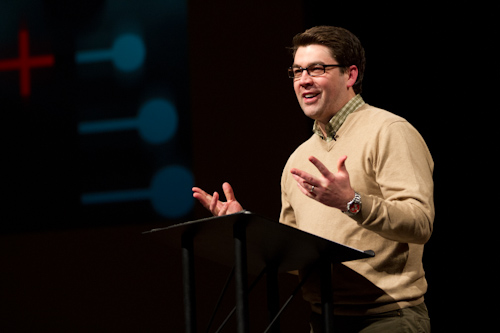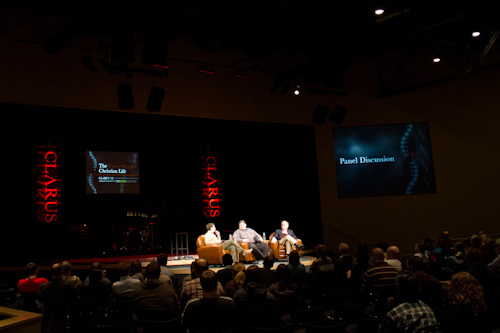Archive for March, 2012
Mar 29
Ways to Search DSC’s Message Database
The internet is good for many things. I’m sure you can think of a few.
Perhaps the best thing that the internet is good for is the wide and voluminous distribution of the Word of God.
Of course, the most important sermon any of us hears in a week is the sermon we hear when we’re together with the body on Sunday morning. But there is a place for listening to a specific sermon at a specific time to address a specific question or need, or just to hear more of the Bible.
That’s part of why we publish almost ten years of preaching and approximately 400 sermons at the DSC Messages page. That’s a lot of sermons! For that reason, it is good to be familiar with the various ways to search the sermon database.
Search by Scripture (New!)
Search by Series
When searching by series, sermons can be filtered by sermon series, conference, seminar weekend, or type of event, like Lord’s Supper. Here are some examples:
- Clarus 2005 – The Reformation: Why Was It Needed and Do We Need Another?
- Colossians: Christ is All
- Elders Q&A
- Lord’s Supper
- Mapping Out The Old Testament
- Proverbs: Wisdom for the Home
- Psalms: Pour Out Your Heart to Him
- Seminar: The Reliability of The Bible
- The Word on Parenting
Search by Speaker
If you remember or want to listen to a sermon by a particular preacher, you can search by speaker. Here are some examples of familiar names:
Search by Topic
Under the umbrella categories of “Theology,” “Worldview and Culture,” “The Christian Life,” “Family,” and “Church and Ministry,” sermons are searchable by a number of topics. Here are some examples:
- The Grace of God
- Assurance of Salvation
- Repentance
- Conflict
- Death and Dying
- Knowing God’s Will
- Work and Vocation
- Parenting
- Church Planting
Search by Date
If you remember a sermon from a particular year or time of year, you can search by year back to 2004.
Mar 27
Clarus ’12 Recap: “The Cross-Shaped Christian Life”
From March 9-11, Christians from Albuquerque, New Mexico, and the surrounding Southwest region gathered at Desert Springs Church for Clarus ‘12, a Regional Conference of The Gospel Coalition. Our speakers, D.A. Carson and Fred G. Zaspel, addressed this year’s theme, “The Cross-Shaped Christian Life” showing how the cross transforms and continues to transform God’s people for His glory.
In addition to a panel discussion led by Ryan Kelly (Audio; Blog Recap), both men spoke a total of three times. For those who couldn’t join us, video will be available in the weeks to come. Audio is available now along with blog summaries for each session:
D.A. Carson
- “Living in a Difficult Time†– 2 Thessalonians 1 (Audio; Blog Recap)
- “The Saving Word†– James 1:12-25 (Audio; Blog Recap)
- “Christians Living in the Last Days†– 2 Timothy 3:1-4:8 (Audio; Blog Recap)
Fred G. Zaspel
- “B.B. Warfield on The Doctrine of Sanctificationâ€Â (Audio; Blog Recap)
- “Serving as He Served†– John 13:1-17 (Audio; Blog Recap)
- “Forgiving As Forgiven†– Matthew 18:15-35 (Audio; Blog Recap)
In addition to a number of other ministries and publishers, we were joined Rick Friesen with Peacemaker Ministries for a special session on Saturday, “Handling Everyday Conflictâ€Â (Audio; Blog Recap). And Jim Tomaszewski joined us from Children Desiring God to host our annual pre-conference Pastor’s Luncheon and Q&A with our speakers.
Photos of the event are available here and here, and at the TGC: Albuquerque Facebook Page.


Mar 26
New iPhone App: “Pray!”
Need help remembering to pray? Need help remembering what and who to pray for?
Yes, there’s an app for that.
Pray! lets you easily create requests, sort requests, and remind yourself to pray. If you have an iPhone, this should prove a helpful resource for praying more faithfully, more regularly, and for the right things.
Screenshots and feature descriptions are available at the Pray! site, and the app is available here through Apple’s App Store.
On the subject of prayer, David Powlison has a helpful lecture, “Modeling Grace Through Prayer Requests.” The audio is available online along with a pdf outline to help you follow along. Prayer, he says, “has this potential to become a door for the most profound forms of one anothering.” Also, if you make a habit out of listening to sermons and would like some encouragement and help in this area, several messages by Jerram Barrs should be helpful from his 2009 visit for DSC’s Prizing the Privilege of Prayer Weekend.
Mar 22
Resources for Depression and Spiritual Desertion
Earlier this week we published a blog in follow up to Ryan’s sermon, “Why Are You Downcast? Unpacking Depression.” That post included a number of Scriptures, quotes, and reflections on the subject of depression and spiritual desertion specifically.
In this post we’re including links to a number of the more helpful books and articles on the subject of depression and spiritual desertion. Of course, a great first-stop in exploring this matter is Ryan’s three-session Saturday Seminar on Depression conducted several years ago here at DSC. The third session was about spiritual desertion specifically.
Resources about Depression in General
- Blame It on the Brain?: Distinguishing Chemical Imbalances, Brain Disorders, and Disobedience, Ed Welch
- The Bruised Reed, Richard Sibbes
- Spiritual Depression: Its Causes and Cure, Martin Lloyd-Jones
- Deserted by God?, Sinclair Ferguson
- When I Don’t Desire God: How to Fight For Joy, John Piper
- Depression: Looking Up from the Stubborn Darkness, Ed Welch
- “Spiritual Depression in the Psalms,” John Piper
- “Depression, Gratitude and Charles Haddon Spurgeon,” Randy Alcorn
- “The Minister’s Fainting Fits,” Charles Haddon Spurgeon
- “Spiritual Depression” (Part 1, Part 2, Part 3, Part 4), Thabiti Anyabwile
- “Lessons from an Inconsolable Soul: Learning from the Mind and Heart of C. S. Lewis,” John Piper
- “Charles Spurgeon: Preaching Through Adversity,” John Piper
- “Insanity and Spiritual Songs in the Soul of a Saint: Reflections on the Life of William Cowper,” John Piper
Resources about Spiritual Desertion
- The Case and Cure of a Deserted Soul: Or a Treatise Concerning the Nature, Kinds, Degrees, Symptoms, Causes, Cures Of, and Mistakes About Spiritual Desertions, Joseph Symonds
- “The Puritain in Private,” in The Genius of Puritanism, Peter Lewis
- A Lifting Up for the Downcast, William Bridge
- Spiritual Desertion, Gisbertus Voetius
- The Dejected Soul’s Cure, Christopher Love
- The Soul’s Conflict With Itself and Victory Over Itself by Faith, in The Works of Richard Sibbes, Vol 1
- Discouragement’s Recovery, in The Works of Richard Sibbes, Vol 7
- A Child of Light Walling in Darkness, in The Works of Thomas Goodwin, Vol 3
- “Desertion: Does God Ever Desert His People?,” C. Matthew McMahon
- “Puritans Living in Relationship to Affliction, Desertion, and Sin,” Joel R. Beeke
Mar 21
“Why Are You Downcast, O My Soul?” Unpacking Depression
This past Sunday Ryan preached his second sermon from Psalms 42-43. Since this particular sermon was on such an important topic, and since there were numerous Scriptures, lists, and quotes worth keeping on hand, this post will collect those for you as you deal with and help others deal with depression.
In his sermon from March 4, “How to Really Talk to Yourself,” Ryan expounded on that important discipline of passionately, persistently preaching truth to ourselves, especially in the midst of trial, testing, doubt, or even despair.  In this Sunday’s sermon, “Unpacking Depression: Why Are You Downcast?“, Ryan focused on the specific problems in Psalms 42-43: dryness, doubt, depression, or even despair. When the psalmist asks of his soul, “Why are you downcast?,” from one angle, he seems to do so rhetorically. In that sense, he has no right to be downcast! But the question can also be seen as a legitimate inquiry, a question that needs answering. And that was the aim of Ryan’s most recent message — to attempt to answer the Psalmist’s question…or at least provide some possible answers to depression’s cry of “Why?”
Depression is a stubborn and complicated thing, mingling body and soul in a knot of unrelenting and often irrational sadness. It is remarkably inconsolable.
Charles Spurgeon wrote of this: “There are dungeons beneath the castles of despair.†On another occasion he explained, “Causeless depression cannot be reasoned with, nor can David’s harp [the Psalms] charm it away by sweet discoursings. [You might as] well fight with the mist as with this shapeless, undefinable, yet all-beclouding hopelessness. . . . The iron bolt which so mysteriously fastens the door of hope and holds our spirits in gloomy prison, needs a heavenly hand to push it back.â€
Richard Baxter, a 17th century pastor, described well the senselessness of what he called “melancholy.”
- It overthrows the sober and sound use of reason; a man’s judgment is corrupted and perverted by it.
- It disables a man to govern his thoughts.
- It swallows up faith itself, and greatly hinders its exercise.It hinders hope; they think that God’s promises are true to others, yet cannot they hope for the promised blessings to themselves.
- It swallows up all comfortable sense of the God’s goodness and love of God.
- It is a false and harmful judge of all the word and works of God.
- It greatly advantages Satan to cast in blasphemous thoughts of God.
- It makes men unfit for all profitable meditation; it confounds their thoughts, and turn them to hurtful distractions and temptations.
- It makes all sufferings more heavy.
Ryan’s sermon unfolded with three main sections. Frist, he answered the psalmist’s question, why are you downcast, O my soul?, with ten possible answers. Second, focusing on that tenth possible reason for depression, Ryan answered the question, has God withdrawn from me? Third, his sermon ended gave some practical suggestions to the question, what shall I do?
Question 1: Why are you downcast, O my soul?
- Perhaps, under the circumstances, it’s an appropriate response. In Psalms 42-43 there are understandable reasons expressed for being troubled. Sometimes distress is a fitting response to distressing circumstances.
- Perhaps there are physical, practical dynamics. The psalmist wasn’t eating or sleeping (42:3). There’s a place for evaluating our diet, our sleep habits, our busyness, temperament, and even lack of sunlight. As Spurgeon wrote: “He who forgets the humming of the bees, the cooing of the pigeons in the forest, the song of birds in the woods, the rippling of rills among the rushes, and the sighing of the wind among the pines, needs not wonder if his heart forgets to sing and his soul grows heavy.â€
- Are there unwarranted and unfulfilled expectations? Proverbs 33:12 says, “hope deferred makes the heart sick.” Maybe we’re trusting in this world for our happiness. Depression is a clear window into what we trust and worship. We do better to look through the window of depression at our hearts rather than simply stare at our depression.
- Are persistent sin and unrepentance involved? In this case, being miserable is a good sign. It may be the misery brought about my sin, or the discipline of the Lord.
- Has there been a neglect of the “means of graceâ€? Are we neglecting the tools necessary to “grow in the grace and knowledge of our Lord and Savior Jesus Christ”, such as Bible, prayer, church, and fellowship?” (2 Peter 3:18). Psalms 42-43 speak to the need for corporate worship.
- Have you forgotten that the kingdom is “now and not yet� (See 2 Corinthians 4:7-10; 2 Corinthians 5; Romans 8).
- Are you giving into doubts? Perhaps you are listening and not preaching to yourself. Push against your doubts, don’t give into them.
- Maybe there’s no good reason, and you need to own that.
- Not unrelated to the above, perhaps it is biochemical. There’s a complex relationship between the body and the soul. For this reason, we should have a chastened approach to the place of medicine in addressing our turmoil. We should not think that emotional/spiritual things have nothing to do with our our brain chemistry, for example. Still, we should never think that the sole answer is medicine, or that medicine is always necessary. If you taking anti-depressants, this must not be the totality of your fight. If you are considering taking anti-depressants, consider that there may be other causes for your trouble. Consider practical/physical dynamics, including diet, exercise, rest, work, and temperament. Consider spiritual dynamics, such as sin, spiritual habits, repentance, and trust in God. In his book Blame it on the Brain, Ed Welch writes about such a chastened approach, “Compassion cannot ignore unbelief or sin. Too often, family and friends think the depressed person is very fragile and cannot handle any frank discussion about sin or hard-heartedness. But to ignore these issues when they are obvious in someone’s life is to treat that person without love and compassion.â€
- Maybe God has withdrawn the sense of his presence for a time. God may do this so that we long for Him more.
Question 2: Has God withdrawn from me?
There are certainly many verses on God not forsaking us. Psalm 9:10 is one of them: “you, O Lord, have not forsaken those who seek you.” And there are many others like it (Psa. 27:10; 37:28; 145:18; Deut. 31:6; Jn. 14:18). But there are also many verses that express a longing for God. For example, in Psalm 42:1, the psalmist writes, “As a deer pants for flowing streams, so pants my soul for you, O God.” And there are other verses like this one, as well (Psa. 42:4, 7, 9; 22:1-2; 42:9; 77:9; 10:1; 13:1; 88:14; 89:46). It seems that God, sometimes, for some people, and for His own mysterious purposes, withdraws the sense of His presence.
This subject of spiritual desertion was actually a matter of abundant writing for pastors and theologians of the seventeenth century. For example, in his work Spiritual Desertion (1646), Gisbertus Voetius gave eleven suggestions as to why he understands that God allows spiritual desertion:
- that we may be tested and so become better known to ourselves and others
- that the desire for grace and glory may increasingly be strengthened in us
- that hidden sins may be uncovered and future sins prevented
- that we may be taught tenderness of conscience
- that we may become empty and poor of spirit
- that we may be weaned of external, earthly joy and consolation
- that we may obtain an aversion to this world and a longing for heaven
- that we may learn to be fed with tears as the only delicacy of consolation when the Comforter does not seem to be present
- that we may cling to his God all the more firmly
- that the graces of God, indeed even the smallest crumb and tiniest feeling, be all the more precious and pleasant
- that the faint and thirsty soul may be flooded by a new stream of consolations, inundated by an entire sea, and possess a new heaven on earth
In other words, his eleventh point reminds us that when comfort does come it is all the sweeter for having known struggle and barrenness — not unlike how a glass of water is cherished more in a parched mouth. Charles Spurgeon testified of his experience with post-depression blessings:
This depression comes over me whenever the Lord is preparing a larger blessing for my ministry; the cloud is black before it breaks, and overshadows before it yields its deluge of mercy. Depression has now become to me as a prophet in rough clothing, a John the Baptist, heralding the nearer coming of my Lord’s richer benefits.
In The Dejected Soul’s Cure the English Puritan, Christopher Love, suggested a few other reasons for God’s loving temporary withdrawals :
God sometimes ‘forsakes’ us that we may not forsake him. . . . A tender-hearted mother may run behind the door from her child in a corner, and hide herself, but it is not because she is angry with her child, but to try the strength of her child’s love in seeking after the mother. God knows perfectly your needs – if we need heaviness, he shall give it.
Similarly, the Scottish Puritain, Samuel Rutherford, wrote, “I know that, as night and shadows are good for flowers, and moonlight and dews are better than a continual sun, so is [God’s temporary withdrawal], that it hath some nourishing virtue in it.”
So it does appear that God has planned for there to be a spiritual ebb and flow, not to our responsibility to pursue Him or to his actual presence, but to the experience of His presence. And when He does, we may assume that He does so, in part, so that when we are comforted by Him in our turmoil it is so that we may be more understanding of and of better help to those who are going through similar experiences.
Though perhaps new and unfamiliar, we should not be surprised by this matter of God withdrawing the sense of His presence for a time. Everyone agrees that God has not given us all of Himself at once. We will know Him in a much fuller glory in the new creation; until then we will know Him in varying degrees of closeness at various times. We should not presume that God isn’t in that and doesn’t have purposes for the ebb and flow of experiencing him.
Question 3: What shall I do?
There are many common false remedies, including a change of scenery or circumstances, distractions like entertainment or work, achievements, busyness in general. But there are some things we can and should do that God has prescribed for us in darker times:
- Know that you are not alone. No depressed person is the first depressed person. Not even close. This theme is all through the book of Psalms because it is common in a falled world, even among God’s people. Depression is also a theme of regular reflection throughout church history. Listen to how Charles Spurgeon began one of his sermons: â€I have to speak today to myself and while I shall be endeavoring to encourage those who are distressed and downhearted, I shall be preaching…to myself for I need something which shall cheer my heart—why I cannot tell, wherefore I do not know, but I have a thorn in the flesh, a messenger of Satan to buffet me; my soul is cast down within me; I feel as if I had rather die than live… I need your prayers.â€
- Investigate yourself; diagnose yourself.
- Do what you know, both physically and spiritually.
- Pray. Take your trouble to Him, ask Him for help, ask Him to show you His nearness. Pray the words of the Aaronic Blessing in Numbers 6:24-26, “The LORD bless you and keep you; the LORD make his face to shine upon you and be gracious to you; the LORD lift up his countenance upon you and give you peace.”
- Preach to yourself. Listen to Ryan’s other sermon on Psalms 42-43, “How to Really Talk to Yourself,” for help with this.
- Look backwards to the gospel and forwards to heaven. In Psalm 42-43 we see this backward and forward looking throughout.
- Wait, not passively but actively. Remember that Psalms 42-43 don’t exactly have a resolution (see 43:5). The psalmist writes as one still waiting for his answer. We shouldn’t be surprised when we find ourselves in that same place.
- Repeat. Notice that the psalmist repeated his main refrain three times: “Why are you cast down, O my soul?”
In the days ahead we will post links to various articles and books related to depression. But for now, consider listening to Ryan’s three-session Saturday Seminar on depression from 2006. In fact session three focuses on this subject of spiritual desertion.







